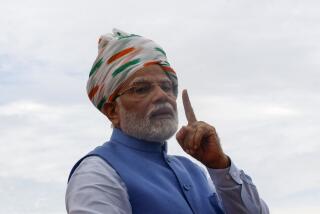On First Day, Russian TV Slams Sacred Cows : Media: It is launched with Yeltsin’s aid and borrowed equipment. The new network pledges objectivity.
- Share via
MOSCOW — After almost a year of fighting the Soviet bureaucracy, the Russian Federation’s fledgling TV company finally hit the airwaves Monday, breaking a state monopoly on television in the country’s largest republic.
“It has been an enormous battle,” said Sergei A. Podgorbunsky, Russian Television’s director. “But the people demanded that we be given a channel. More than anything else, this is a victory for the Russian public.”
It was also a victory for Russian leader Boris N. Yeltsin, who had overcome obstacles set up by Soviet President Mikhail S. Gorbachev and the state television company.
“Yeltsin has played a huge role, and he keeps helping us by constantly pressuring the president (Gorbachev),” Podgorbunsky said in an interview. “Without his help, we probably would not be going on the air today.”
During its maiden broadcast, Russian Television made it clear that it plans to take a heretical view toward what state television would consider Soviet sacred cows. It showed Lithuanian President Vytautas Landsbergis predicting more Kremlin repression; a report from the war-torn Armenian-Azerbaijani border that accused Soviet troops of aggressively attacking citizens, and an old peasant woman singing a satirical song that lambasted Gorbachev.
“Comrade Gorbachev, see what you’ve done!” she sang as her husband accompanied her on the balalaika. “You wanted to prohibit vodka, but instead you’ve introduced hunger!”
Although the smaller Soviet republics have long had their own TV channels, often in local languages, Russian viewers had only one choice: the programs beamed by Gostelradio, the central government’s radio and television company.
During the first several minutes of air time, network executives gave earnest speeches about their commitment to objective, well-rounded news, in contrast to the tightly controlled and often biased programs on Soviet TV.
In a taped interview, Yeltsin said: “The history of creation of Russian TV is curious and unconventional. That I had to have at least four forceful conversations with the president shows what labor was required for its success.”
The general director, Anatoly G. Lysenko, looking uncomfortable in front of a camera, told viewers his programming would attempt to help the people of Russia learn “how to choose a road that will not lead us into the swamp.”
The news program, “Vesti,” which runs for 15 minutes at 1:15 p.m., 8 p.m. and 11 p.m. daily, opened with a clock ticking down the hour--just like “Vremya,” state television’s nightly news. But that’s where the similarity ended.
Flames and space travel images were the most frequent graphics. The musical introductions used rock ‘n’ roll.
“Vesti” covered domestic and foreign news at a lightning pace. One segment showed Russian TV correspondents caught under fire while investigating the warfare in Armenia and Azerbaijan. The correspondent criticized Soviet troops for disarming not only citizens but also police, for causing so many victims and for obstructing journalists.
Podgorbunsky said one of his news team’s major missions is to broadcast objective reports on the country’s bloody ethnic conflicts.
“We will strive so that what goes out over our airwaves will be maximally democratic. When people switch on our shows, they will get more objective news and more various opinions than they do today. We don’t want to push our views on people. We hope to give them the information so they can make up their own minds.”
It remains to be seen whether Russian TV will have the chutzpah to criticize the bureaucracy that funds it, namely the Russian Parliament chaired by Yeltsin.
The fledgling TV company has no channel, building or equipment of its own--but it hopes to by autumn, officials said.
“They will give us only six hours and 15 minutes a day--they refuse to give us a whole channel,” Podgorbunsky said.
Podgorbunsky said he was worried that the inferior technical equipment might impair the programming and hurt its popularity.
“Unfortunately, much depends on equipment,” he said. “We’re afraid the quality of our programming will not be very high. We are forced to rent equipment from Central Television. They do not give us much equipment, and what they give us is their worst stuff.”
The staff includes many of the top stars of Soviet TV who jumped ship or were fired after Leonid P. Kravchenko became director and started imposing many of the old rules of censorship. Podgorbunsky is one of them.
Russian Television’s attitude toward “Vremya” was clear from the first “Vesti” broadcast. With a sly smile, the cheery young anchorwoman noted: “Now for information which undoubtedly will precisely coincide with that of ‘Vremya’--the weather forecast.”
More to Read
Sign up for Essential California
The most important California stories and recommendations in your inbox every morning.
You may occasionally receive promotional content from the Los Angeles Times.









